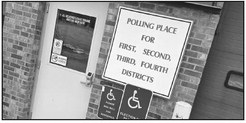When health care is too expensive
A man in his 50s infected with the novel coronavirus in Washington state died on Feb. 28 state health officials said.
Perhaps this is not the best time for America to have a broken health care system.
For America to contain coronavirus, this country will need to test and treat mass numbers of people. We will need isolation rooms in hospitals, respirators and lots of face masks.
But we will also need a cooperative public. And herein lies a terrible problem. A December 2019 poll conducted by Gallup found that 25% of Americans say they or a member of their family have delayed medical treatment for a serious illness due to the cost of care. An additional 8% report delaying medical treatment for less serious illnesses.
The United States cannot get a handle on coronavirus if people, either lacking health insurance or unable to pay deductibles and co-pays with the insurance they have, decline to get treated for their flu symptoms.
A tracking poll from the Kaiser Family Foundation heightens these concerns. Over a third of Americans are “very worried” about being able to afford an unexpected medical bill, the February 2020 poll reports, and, among those who carry insurance, 49% worry about paying their deductible. Worry about the cost of medical care trumps concerns people have about paying for the other necessities of life, including rent, gasoline, utilities and food. People with insurance lack the cash to pay for what could be trivial amounts of medical care. The poll notes that 45% of insured Americans could not pay an unexpected $500 medical bill. Half of this group would finance the care with a credit card.
Think about the case of Frank Wucinski and his three-year-old daughter Annabel as reported by The New York Times.
The American citizens, who were flown out of Wuhan, China, by the federal government, were required to sit in a two-week quarantine at a Marine Corps station in San Diego followed by two three-to-four day stays in a children’s hospital isolation room. Both father and daughter tested negative for coronavirus. Once released, Wucinski received $3,918 in bills from hospital doctors, radiologists and an ambulance company. Wucinski, who had health insurance in China but not the United States, can’t afford the bill and argues that he shouldn’t be charged for medical services he never consented to.
What if a coronavirus pandemic hits the United States and, in time, there are thousands, perhaps millions of Frank Wucinskis?
How can this country fight this lethal virus when hospitals, doctors, law enforcement and public health agencies will likely battle with insurance companies over who is legally required to pay for mandatory quarantines and patient testing? Right now, the basics are unsettled. If public health officials order an individual with a high temperature to a hospital for coronavirus testing, who pays the bill? The individual? The government? The insurance company? The federal Center for Disease Control has the power to say, but, to date, it hasn’t. Many hospitals require patients to pre-pay a portion of their bill before they are admitted. But what about a coronavirus patient who refuses or has no ability to pre-pay? Must the hospital provide charity care? Must the government reimburse the hospital for its loss? Or is the patient not admitted for care?
Arguably, the United States has the world’s most sophisticated medical care. Of the 30 most technologically sophisticated hospitals in the world, half of them are located in this country. Yet our sophisticated system is also an expensive system. In 2018, the United States spent $3.65 trillion dollars on health care. That calculates to over $10,000 per person each year, which is double what is spent by France, Canada, Japan, Australia or the United Kingdom.
A tragedy will unfold should this country have a health care system that is so modern, sophisticated and expensive that large numbers of people can’t use it and, because of an access issue, this country stumbles in fighting the coronavirus.
Back in 1918, 675,000 Americans died from the Spanish Flu that killed 50 million people worldwide. In the succeeding century, there have been great medical advances, but in this country we have never figured out how to provide people, both rich and poor, with universal health care. We fret that a deadly coronavirus may be on a path to exploit this political failure.
— Peter Weinschenk, editor, The Record-Review




